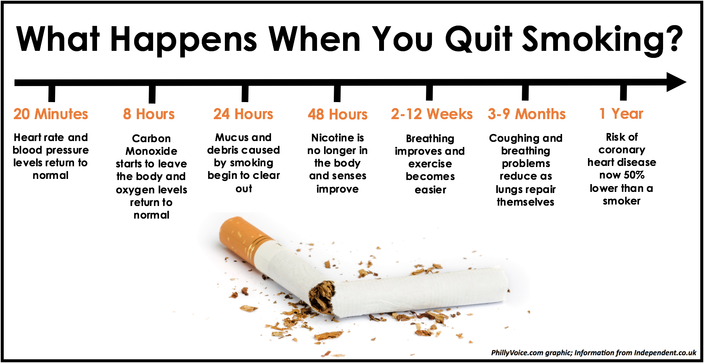
October 18, 2016
 Thom Carroll/PhillyVoice
Thom Carroll/PhillyVoice
It takes as little as 20 minutes to begin feeling the immediate benefits of quitting.
From New Year’s resolutions to self-improvement goals, the desire to quit smoking is something many strive for and accomplish each year. It is a difficult feat, yet the long-term benefits are beyond worth it. In fact, it takes as little as 20 minutes to begin feeling the immediate benefits of quitting. Here are a few ways your body reacts after that last cigarette.
Smoking makes your heart rate increase as well as your blood pressure. This is due to the nicotine inside the cigarettes which, according to Livestrong, “causes your veins and arteries to constrict, meaning your heart has to work harder than usual to pump the blood around your system.” A healthy heart will beat 60 to 100 times per minute, and for a smoker, the heart can beat “10 to 25 beats faster per minute,” according to Discovery Health.
Twenty minutes after you ditch the habit, you’ll notice your blood pressure levels normalizing and feel your heart rate decreasing, slowly going back to its original pace.
 PhillyVoice Graphic; Info from Independent.co.uk/
PhillyVoice Graphic; Info from Independent.co.uk/ You may feel hungrier than usual after quitting — and this is just one of the ways your body will react to withdraw from cigarettes. Your appetite increases after quitting because the nicotine in cigarettes acted as an appetite suppressant, meaning that when in your system, nicotine made you feel full even when you were not.
When you no longer have nicotine suppressing your appetite, you’ll get your usual appetite back. Smokers who have recently quit may gain anywhere from six to nine pounds while recovering. Don’t let this scare you! One of the best ways to make sure that you don’t pack on the pounds is to begin or up your exercise regiment. Exercise is also a great way to keep yourself busy, and craving-free.
Smoking affects your respiratory system, and after you quit, you’ll feel the effects of your body recovering. Carbon monoxide is inhaled when you smoke, and this chemical attaches itself to your blood cells. According to Quit Smoking Community, this “makes it difficult to breathe at times, and it can cause you to feel exhausted or out of breath after short exertions.”
Twelve hours after you quit smoking, you’ll feel that breathlessness start to fade away. You’ll additionally feel more energized and will be able to stay that way for longer periods of time, finding it easier to enjoy life.
Smoking can affect your sense of taste and smell. Many get used to these altered ways of life, so when you quit, it’s like starting anew. Imagine fully enjoying your favorite meals, with all your senses again! Within as little as a few hours after swearing off smoking, you’ll feel your sense of taste and smell coming back.
So how does smoking affect these two very important senses in the first place? The chemicals you inhale while smoking dull your taste buds and the chemicals build on top of each other, dulling your taste buds even further. Because your nose and mouth are connected, your sense of smell suffers as well. After you quit, you’ll finally have your sense of taste and smell back.
When you decide to quit smoking, your body will rapidly begin to adjust to the nicotine-free lifestyle. Sure, you’ll experience some changes, and some will be more difficult to adjust to than others – but the pros far outnumber the cons, and ultimately, you’ll be adding years to your life.